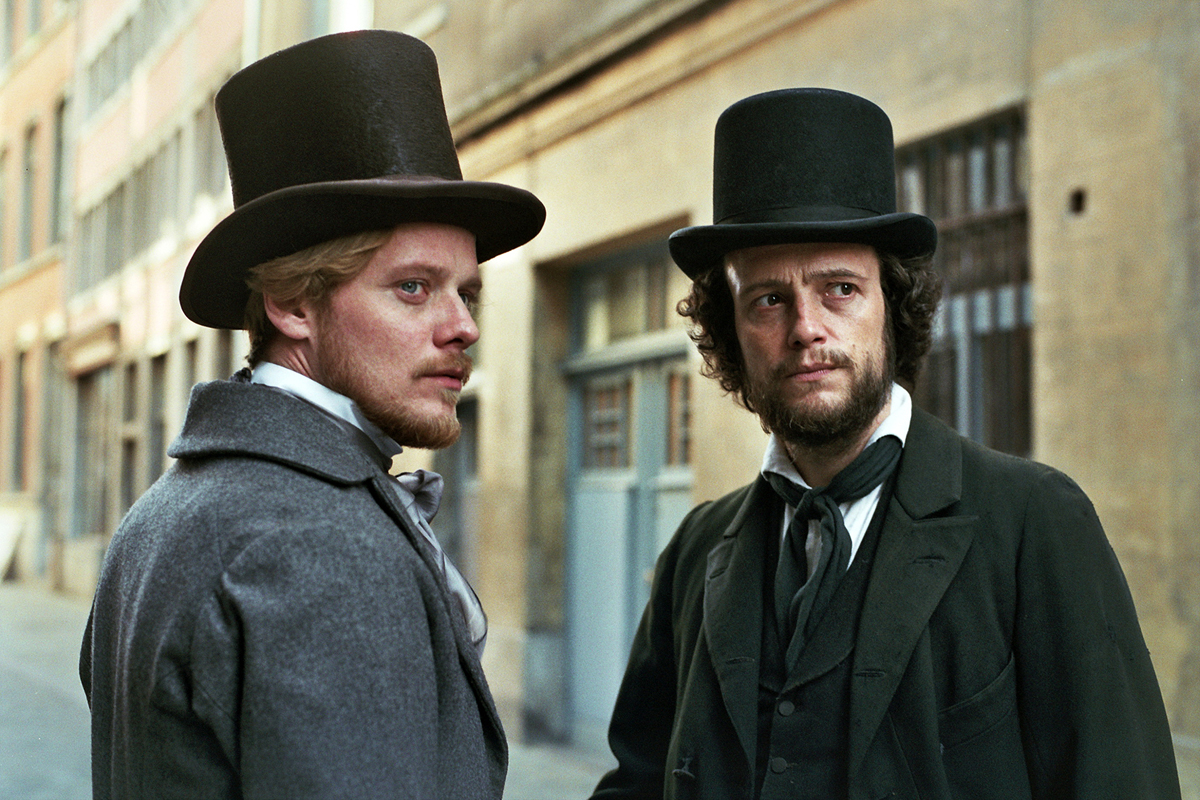
Young intellectuals smoking cigars, playing chess and trading philosophical barbs between moves in the mid-19th century may not seem like the makings of compelling cinema. But when situated in a European society newly transformed by the Industrial Revolution and centered on a 26-year-old protagonist destined to become the founding father of communism, The Young Karl Marx achieves the improbable: offering a gripping two-hour narrative with an appeal beyond the Jacobin faithful.
That feat belongs to Haitian filmmaker Raoul Peck, whose 2016 Oscar-nominated documentary, I Am Not Your Negro, delved into the torment of America’s anti-black racism through the illuminating voice of James Baldwin. For his 2017 biopic of Marx, Peck returns with a man enveloped in the world of theories, not novels. It’s a muse he knows well; Peck studied the philosopher at the University of West Berlin. He didn’t want to resurrect the elder, bushy-bearded Marx, though, whose portrait lives online, urging people to “seize the memes of production.”
Instead, the film introduces us to a young frizzy-haired Prussian philosopher with more modest brown bristles framing his face. As editor of the Rheinische Zeitung, Marx (August Diehl) chastises his room full of writers for their vague proclamations in repressive times. He refused to censor himself with carefully chosen words, so Prussian authorities ransack his office. We also meet Friedrich Engels (Stefan Konarske) in Manchester, England, as he rebukes his wealthy mill-owner father who scolds outspoken workers. “You want to tell me how to run a factory?” his father asks.
“No, father,” Engels responds. “That is not my ambition.”
In 1844, an exiled Marx meets Engels in Paris. The two seem an unlikely pair at first, with Marx admonishing Engels as a “wealthy amateur.” But when Marx’s arrogant temperament finally cools, they exchange pleasantries. To Engels, Marx is the greatest materialist thinker of the era. In kind, Marx expresses admiration for Engels’ classic study of the English working class. The friendship they share becomes the crux of the film. Living life as a precariat long before the term was coined, Marx tries to raise a family with his wife, Jenny, on the unstable income being a radical writer earns. Engels, a signatory for his father, provides the financial stability for Marx’s mind to flourish.
But the bond is deeper than money, of course. The two share a drunken stumble after a night at the tavern, where Marx utters his famed dictum about philosophers merely interpreting the world when the point is to change it. The friendship strikes a more heartfelt tone over letters when Marx is banished from France and writes of his daughter Laura being born while Engels bemoans carrying on with his bourgeois life instead of making revolution. The two reunite in London, where they enlist in the League of the Just, only to transform it into the Communist League with Marx’s calculated ascent. All that’s left, Engels advises, is to author a manifesto.
The Young Karl Marx resurrects other rousing intellectuals of the time, French anarchist Pierre-Joseph Proudhon chief among them. He cautions his counterpart against becoming another Martin Luther, assailing one religion only to create another equally hostile one in its place. The brief niceties between Marx and anarchist Mikhail Bakunin in Paris offer no hint of the showdown to come between them decades later during the First International. Much of the film’s intrigue rests in presenting these conversations between theoretical titans in our increasingly anti-intellectual times. Without turning to mythos, Marx himself is portrayed as a passionate, conflicted man tempted more than once by the stability of domestic life, a far cry from the West’s fiendish caricature of him as well as socialist idolizations of the past.
With end credits that double as an epilogue of sorts, Peck pairs Bob Dylan’s “Like a Rolling Stone” with scenes of Che Guevara in Cuba, Vietnamese jungles under aerial bombardment, and Salvador Allende besieged by fascists. Ronald Reagan and Margaret Thatcher walk together comfortably in the cinematic collage. It’s clear Marx’s legacy set the world ablaze in class conflagrations that proved more pivotal than the failed revolutions of his own time. Two decades into the 21st century, it’s also clear who emerged victorious and proclaimed the end of history.
The embers of revolution may still glow in the jungles of Chiapas, Mexico, and in the Kurdish regions of Rojava. But the world belongs to the wealthy in the Cold War’s aftermath. The richest 1 percent owns half of its spoils. If Marxism lays discredited, the miserable masses are left rudderless while the earth edges closer to a climate catastrophe embedded within industrialism like a time bomb.
With such a triumph of capitalism, The Young Karl Marx may serve both as a reflection of the past and cautionary tale for the future, a specter unfinished with haunting us all.
The Young Karl Marx was directed by Raoul Peck; co-written by Pascal Bonitzer and Peck; and stars August Diehl, Stefan Konarske and Vicky Krieps. Now available on iTunes, Amazon, other digital platforms and cable-TV on-demand.

Gabriel San Román is from Anacrime. He’s a journalist, subversive historian and the tallest Mexican in OC. He also once stood falsely accused of writing articles on Turkish politics in exchange for free food from DönerG’s!

